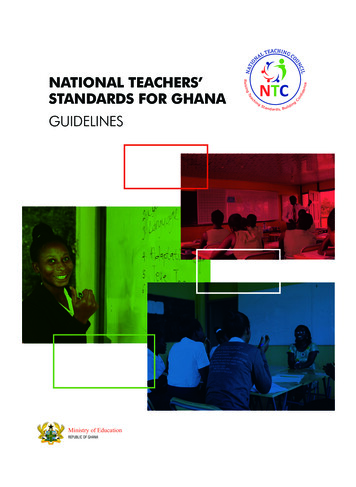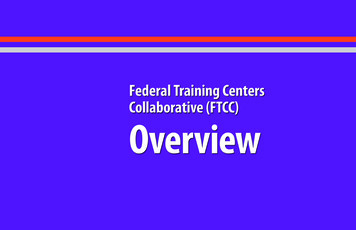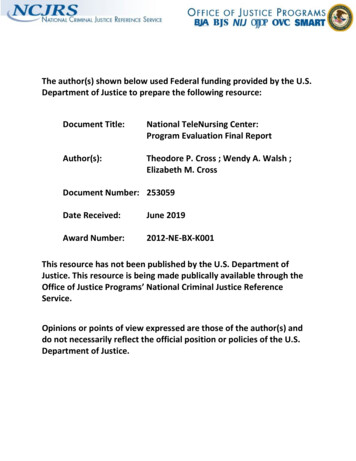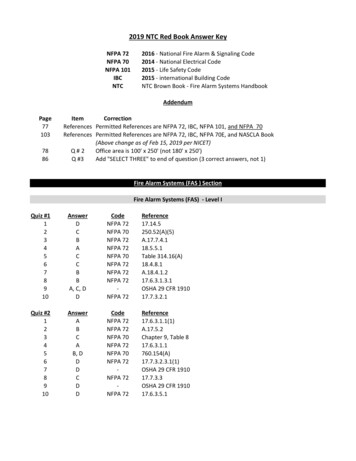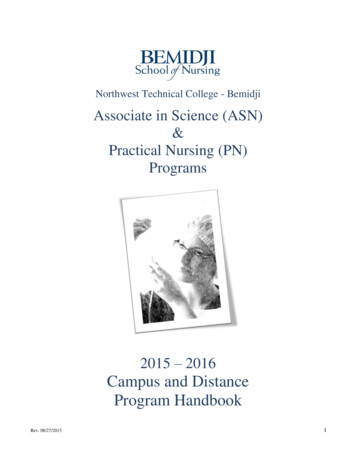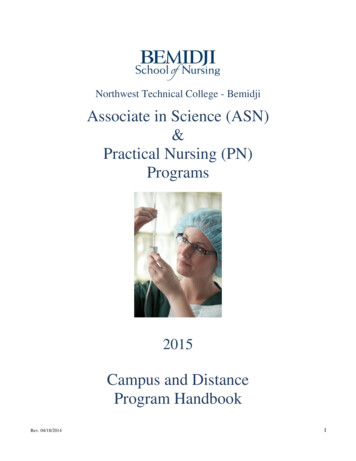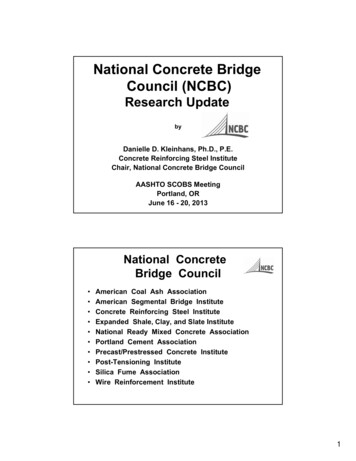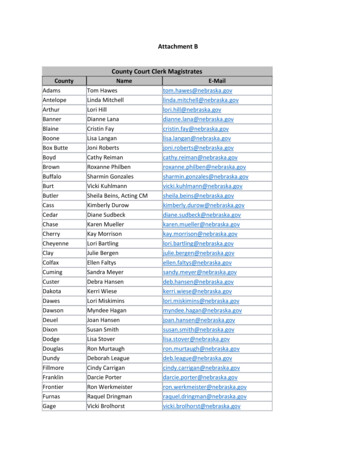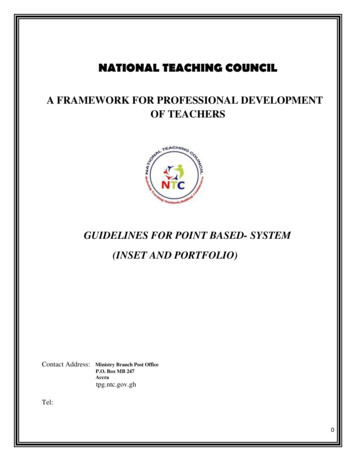
Transcription
NATIONAL TEACHING COUNCILA FRAMEWORK FOR PROFESSIONAL DEVELOPMENTOF TEACHERSGUIDELINES FOR POINT BASED- SYSTEM(INSET AND PORTFOLIO)Contact Address:Ministry Branch Post OfficeP.O. Box MB 247Accratpg.ntc.gov.ghTel:0
Published by:The National Teaching Council (NTC)Ministry of EducationP.O. Box MB. 247Accra-GhanaTel: ( 233)552828853Email: info@ntc.gov.ghWebsite: www.tpg.ntc.gov.ghCopyright 2020 NTCNational Teaching CouncilMinistry of EducationAccra, GhanaISBN:978-9988-3-0779-0All rights reserved. No part of this framework may be reproduced or transmitted in any form or by anymeans electronic or mechanical or by any information storage and retrieval system without permissionfrom the publisher.1
This Framework has been designed by the National TeachingCouncil to serve as a guide for teachers and service providers to plan,design and implement appropriate Professional Development (PD)plans and programmes.For further information, contactThe National Teaching Council (NTC)P.O. Box MB. 247Accra-GhanaTel: ( 233)552828853Email: info@ntc.gov.ghWebsite: www.tpg.ntc.gov.gh2
TABLE OF CONTENTSContentsPagePREFACE . 5ACKNOWLEDGEMENT . 6ABBREVIATIONS . 7Introduction . 8SPONSORSHIP / ADVERTISMENT PAGE. 11MANDATE OF NATIONAL TEACHING COUNCIL (NTC) . 12PROFESSIONAL DEVELOPMENT (PD) DEFINED. . 13RATIONALE FOR INTRODUCING PD ACTIVITIES . 13OBJECTIVES OF PD . 13IMPLEMENTATION OF THE PD POLICY . 14VALIDATION OF RECOMMENDED POINTS. 15Components of PD . 15Cycle of PD and Allotment of Credit Points . 15Table 1: Suggested PD Points Required by Teachers on the Designated Ranks within the three (3) yearCycle. 16Table 2: Recommended Activities for Continuous Professional Development of Teachers (Measurementwill be Evidence Based) . 17Mandatory Courses for all In-Service Teachers . 22Table 3: Rank Based Training for all In-Service Teachers . 23CALCULATION OF PD CREDIT POINT . 30Table 4: TOTAL POINTS REQUIRED TO BE ACCRUED FROM EACH CATEGORY BY . 31Table 5: Calculation of PD Points Expected to be Accrued Within One Year by a Teacher in a SpecificRank32Mode of TCPD Delivery in terms of the three Categories . 33Payment for Demand Driven TCPD Programmes . 33Supply Driven TCPD . 34Relevance of Point Based System . 34Appeals . 34Focus of PD . 35Mode of Application . 35Non-Compliance and Penalties . 36Organizations expected to promote PD . 37Submission of PD Information . 37UNIQUE CASES . 38The Role of Employers of Teachers . 38The application form for PD service providers is provided below. . 39Certification of Facilitators . 41Associate facilitator . 41Independent Facilitator (Autonomous Accredited Facilitator-A2F) . 41Requirements:. 41CERTIFICATION OF SERVICE PROVIDERS AND ACCREDITATION OF NTC PROGRAMMES 42JURY OF CERTIFICATION AND ACCREDITATION . 43Renewals: . 43Training . 433
Illegalities . 43Publicity . 44GUIDELINES FOR CERTIFYING TEACHER TRAINING CENTRES . 44Registration of Training Centers: . 44NATIONAL TEACHING COUNCIL . 45APPLICATION FOR PROGRAMME ACCREDITATION . 454
PREFACEDemand for quality teachers in Ghana and beyond has become a global concern. This is as a result ofreliance on quality education as a wheel for socio-politico-economic development of nations. Educationof any nation depends on the quality of teachers who implements the educational laws and policies.Education is dynamic and streams in line with global trends in socio economic development andtechnological advancement.One critical challenge found to be associated with most teachers is subject matter knowledge, actionsystem knowledge as well as behaviour modification and class management skills. In addition,integration of inclusive pedagogies in teaching and learning strategies, reflective practice, developmentof teaching portfolio and action research have virtually been missing in the teaching profession andthese have adversely affected the professional growth of teachers resulting to low learners’ attainmentof educational goals. Though the National Teachers’ Standards provides the basis for professionalgrowth of the teachers, there is the need to put these standards in action.To do this, PROFESSIONAL DEVELOPMENT (PD) which is found to be an integral component ofteacher professionalism is identified to provide ways that enable teachers keep up with the relevantand up-to-date pedagogical and subject content knowledge in their fields of expertise. Besides, PD hasthe potential to equip teachers with skills and competencies that will make them versatile individualscapable of delivery the educational deliverables towards the achievements of national goals andaspirations. The PROFESSIONAL DEVELOPMENT framework has therefore been developed toactivate the standards enshrined in the National Teachers’ Standards to provide guidelines for teachersto build their capacities to meet learning needs of their learners.The Ministry of Education, Ghana approves of this framework and recommends for its use in all mattersrelating to PROFESSIONAL DEVELOPMENT of teachers, particularly, those in public and private pretertiary education sector. It is also recommended as a reference material for all service providers,NGOs and institutions interested in supporting teachers in pre-tertiary education sector to build theircapacities. Again, it is expected that this framework will be used by policy designers and implementers,particularly, Ghana Education Service, Council for Technical and vocational Education and Trainingand publishers.It is hoped that the use of this framework will help establish a strong foundation in the attainment ofeducational goals through quality delivery of instruction.5
ACKNOWLEDGEMENTSThe National Teaching Council (NTC) would like to express its appreciation to those who contributedtowards the design of this framework. Most importantly, we are grateful to the Ghana EducationService, the Ghana National Association of Teachers, National Association Graduate Teachers,Coalition of Concerned Teachers-Ghana, All Teachers Alliance, Ghana (ATAG), Association of PrivateSchools, Assessment Consortium, UNICEF, Japan International Cooperation Agency (JICA), andPTPDM Project for supporting this effort. The support received from the Ministry of Education andGALOP is highly acknowledged. The NTC is also grateful to the project team members whoindependently shaped the framework and digitised it.The following is the list of persons who contributed to this document in diverse ways.Project team members:Prof. George Kankam - University of Education WinnebaLawrence Sarpong - National Teaching Council; Key Technical CoordinatorDerrick Nii Adjei Adjei - National Teaching Council; Technical OfficerBernard Kuug – National Teaching Council; Technical OfficerProject Supervisor:Dr. Christian Addai-PokuRegistrar, NTCReviewers:Prof. Eric Nyarko-Sampson,Mr. Christian Addai-PokuDr. Evelyn OduroProf. George K KankamMr. Lawrence SarpongRev. Thomas Kofi AbhorMr. Gideon AhoholuMs. Francesca HaizelMr. Francis Kwasi AddaiMs. Hazel Konadu SarpongMs. Grace Agyeman DuahMrs. Monica Effe TetteyMr. Thomas MusahMr. Ako ForsonMr. Frank DadzieHayley NiadAnne HavesAngela AffranRhoda EnchilBoard Chairman of the NTC (2016-2021)Registrar, NTCAg. Executive Secretary, NTC (2016 to 2019)Chairman, Professional Development Committee, NTCAg. Director Dept. of Professional Development of Teachers, NTCMember, Professional Development Committee, NTCFormer Head of Examinations, NTCAg Head, Research Unit, NTCAg. Director; Licensing and Registration, NTCAg. Head Monitoring and Evaluation, NTCAg. Head, Standards and Enforcement, NTCSecretary, Professional Development Committee, NTCHead of Education and Member of youth Desk, GNATDep. General Secretary, Coalition of Concerned TeachersGeneral Secretary, National Association of Graduate TeachersInclusive Development PartnersInclusive Development PartnersInclusive Development PartnersUNICEF6
ISBOPDSchool Based In-Service Teacher Education and TrainingCommunity of PracticePROFESSIONAL DEVELOPMENTDepartmental Based In-Service Teacher Education and TrainingDepartment of PROFESSIONAL DEVELOPMENT of TeachersIn-Service Teacher Education and TrainingNewly Qualified TeachersNational Teaching CouncilProfessional Learning CommunitiesPre-Tertiary Teacher Professional Development and ManagementSchool Based In-Service Teacher Education and TrainingSchool Based OrientationTeacher PROFESSIONAL DEVELOPMENT7
IntroductionBroadly, Teachers’ PROFESSIONAL DEVELOPMENT (PD) is a systematic and sustained process bywhich a teacher not only maintains, but also improves and expands his/her professionalknowledge, values and skills. The Teachers’ PROFESSIONAL DEVELOPMENT Framework (‘PDFramework’) is designed by the National Teaching Council (NTC) of Ghana and formalises a teacher’sresponsibility and commitment to being a professionally competent and relevant practitioner.The Framework serves as a guideline for Teachers, Education Directors, Teacher Education ServiceProviders and other stakeholders on provision of quality teacher training programmes for In-ServiceTeachers. The Framework has identified different activities which have been grouped as Mandatory,Ranked Based and Recommended activities. The latter is also grouped into categories based on thecomplexity nature of the activities and level of involvement of the teacher. This is to ensure consistencyin calculation of and validity in assigning credit points. Teachers at specific ranks are to access activitiesfrom both Mandatory and Ranked Based Trainings. In addition, they are required to select any of thecategories within the Recommended Trainings to meet a required PD point at that rank in a-3year PDcycle. The teacher can access trainings from the employer either at the school level through ProfessionalLearning Communities-PLC (School Based, Departmental Based or Cluster Based) Community ofPractice-CoP (Workshop for Heads of Institutions or School Improvement Officers (SIO) or teachers fora particular subject or teachers of a particular class (BS3, BS1, KG2) or teachers assigned with commonroles and responsibilities. Such programmes are mostly supply driven. Teachers can also use theteachers’ portal to access PD activities from Accredited Service Providers on Demand. DevelopmentPartners and NGO’s working closely with the Ministry of Education are also certified to collaboratewith District Education offices to provide supply driven programmes to teachers. NTC will collaboratewith NIB to monitor such trainings to ensure standards are met.The framework provides formulas for calculating PD points at their respective ranks. PD activities aredocumented in Teachers’ Logbook as backup records which are transposed to the teacher’s onlineaccount. Names of certified activities are saved in the portal for PD providers to select and award pointsto teachers who may attend that programme. In addition to the PD points, teachers are also required tobuild their own portfolio for assessment and these two (PD points and Portfolio Assessment Grade) areused to determine the professional standing of the teacher. Should a teacher meet the PD pointrequirements but failed in Portfolio Assessment or the other way, that teacher cannot renew his or herlicense and cannot practice as a teacher according to the Teacher Regulatory ACT of Ghana. Teacherswho accept postings to where the employer and the National Teaching Council define as deprived area8
are given additional opportunities to access 2 demand deriving PD programme which shall be organisedby the employer in collaboration with the National Teaching Council without any payment by theemployee except for transportation and feeding.9
RELEVANT SISTER INSTITUTIONSThese are Institutions that provide similar regulatory framework for professionals. A brief synopsis ofsuch institutions provides foundational information to both teachers and PD providers on the need tocomply with this regulatory framework.In Ghana, the Nursing and Midwifery Council, Dental and Medical Council as well as Ghana LegalCounsel have similar frameworks that guide the professional growth of their practitioners. Again, tutorsin Colleges of Education in Ghana have since 2013 have been attending PD programmes, once everyweek. This has enriched the professional competences of tutors in Ghanaian Colleges of Education andhas translated in their professional routines.In addition, all member countries of Africa Federation of Teaching Regulatory Authorities such asZambian Teaching Council, Teacher Registration Council of Nigeria (TRCN) and South AfricanCouncil for Educators are all operating under similar regulatory framework.It is, therefore, not limited to Ghanaian Teachers alone, as a result, stakeholders are encouraged toembrace this framework and support its implementation to improve the academic achievements of theGhanaian child who is the ultimate beneficiary of this framework. It is believed that the future of theyoung generation and our country depends on a well-equipped and skilful teacher who is abreast of themodern trends of teaching and learning. This framework has therefore been designed as the operationaldocument of the National Teachers’ Standards with the surety that teachers will build theircompetencies, enhance their professional values, practices and knowledge as they access the relevantPD activities specified in this document.To achieve the purpose of this framework, NTC will enforce the implementation process which is theresponsibility of the employer and other certified PD Service Providers. In addition, National SchoolInspection Authority (NaSIA) shall support the Department of Professional Development of Teachersand the License and Registration Departments; all of NTC to monitor teachers’ training records andlicense.Also, any training materials developed by or for PD Service Providers shall be submitted to Departmentof Professional Development of Teachers (DPDT) in NTC for evaluation and award of points before itwould be used for training of teachers.10
SPONSORSHIP / ADVERTISMENT PAGE11
MANDATE OF NATIONAL TEACHING COUNCIL (NTC)The National Teaching Council (NTC) which was established by 2008 Education Act (ACT 778) and itis mandated by Education Regulatory Bodies Act 2020 (Act 1023, section 59) to regulate teachingprofession in Ghana.The section 60, subsection (a) clauses i and ii requires the Council through its governing body to:Advise the Minister:i. on matters relating to the professional standing and status of teachers; andii.on the education, development and the employment of teachers.Subsection (g) of the same section requires the Council to ACCREDIT, in collaboration with relevantagencies and institutions offering teacher education and development programmes.In addition, subsection (k) requires the Council to develop and promote Continuing ProfessionalEducation in teaching profession.Similarly, subsection (o) requires the Council to provide a framework for development of teachereducation curriculum.Subsection (p) also recommends the Council to perform any other function incidental to the object ofthe CouncilIn line with this policy direction, NTC has put in place a Professional Development (PD) frameworkthat supports teachers to progress along their career path through professional ranking (levels) system.12
PROFESSIONAL DEVELOPMENT (PD) DEFINED.PROFESSIONAL DEVELOPMENT (PD) refers to the process by which teachers maintain and enhancetheir knowledge, skills and experiences gained as they work, beyond any initial training. Furthermore, itis a record of what teachers’ experience, learn and apply. Consequently, PD activities involve thedevelopment of those qualities that are required by teachers for carrying out their professional andtechnical duties during their teaching career.PD is an integral component of teacher development. This includes training and education programmesorganized within or outside the school environment which NTC approves as being relevant to theteaching profession and meeting prescribed standards.RATIONALE FOR INTRODUCING PD ACTIVITIESThe rationale for introducing PD activities is to provide guidance for teachers to continue to improvetheir competencies to maintain the integrity of the teaching profession and improve their professionalstatus. It is envisaged that going through the listed accredited PD activities would help maintain andenhance the knowledge, skills, attitudes and experiences gained after the initial training. It is essentialfor teachers as professionals to preserve their professional integrity by updating their knowledge andskills to keep them abreast of contemporary issues and approaches in education.OBJECTIVES OF PDPD for teachers is intended to:i.Provide a forum for harnessing ideas and experiences to improve professional competence andcommitment.ii.Offer intellectual, emotional and social engagements for the teachers to enrich their experiences.To teach for better understanding, teachers must be intellectually engaged in their discipline andwork regularly with others in their field.iii.Maintain high competence that is results from life-long learning.iv.Demonstrate the social responsiveness by encouraging members of the teaching profession tocollaborate as community of experts (Professional Learning Community – PLC), be current,skilful and knowledgeable in their practice.v.Keep teachers in good standing and be abreast of time.vi.Maintain professional excellence.13
vii. Make available prospect to supplement the initial training of teachers and improve theirknowledge, skills, attitude and practices to meet diverse learners’ learning needs.viii. Assistteachers to adapt, contribute, think critically and participate actively in addressing challengesassociated with teaching and learning and implement recommendations.ix.Augment teachers’ commitment to their chosen profession.IMPLEMENTATION OF THE PD POLICYThe Pre-tertiary Teacher Professional Development and Management (PTPDM) policy outlines theimportance of PROFESSIONAL DEVELOPMENT for teachers. The policy emphasizes competencybased approach which requires regular In-Service Education and Training (INSET) to develop teachers’capacities. According to the policy, teachers will be assessed based on defined competencies andevidence of professional proficiency. It is therefore the responsibility of individual teachers in Ghana toselect, undertake and document relevant PD activities they partake in for the purposes of growingthrough the profession to maintain their professional status. Any PD activity undertaken that is not listedas indicated, should be referred to the Governing Board of the National Teaching Council for approval.Teacher training logbooks have been developed to document teachers’ training records and related PDcredit points. Where the means of documenting the activities are not immediately available or there isno designated person to verify the activities, it is the responsibility of the teacher to save evidence (E.g.,registration, certificate and attendance records) of the activities for submission at the appropriate timeand place as may be directed by NTC.In addition to the PD programmes attended, teachers are required to upload their portfolio records ontothe PD portal for onward assessment by Portfolio Assessors.PORTFOLIO ASSESSMENTEach Portfolio Assessor has a unique pin to access teachers’ portfolio content for evaluation. Thedetailed criteria for portfolio assessment is documented in the teachers’ portfolio document.The Assessors can assess the records online and make entries without knowing the identity of theirclients. However, their comments can be seen by their clients. Any form of correspondence between theassessor and the teacher via portal can be monitored by the administrators of the portal. The Ratedscores given by the assessors is added to the PD scores accrued in the point-based system to determinewhether the license of the teacher can be renewed or issued as in the case of Newly Qualified Teachers14
(NQTs). It should be noted that until such a time where portfolio assessment can be done fully via theonline portal, face-to-face assessment or combination of face-to-face and online would be used.VALIDATION OF RECOMMENDED POINTSUpon meeting the portfolio standards and PD points determined by NTC, the administrator validatesand submits a summary of the teacher’s record to Licensing portal as a recommendation for renewal oflicense or issuance of license (In the case of teachers on induction). The same summary of records canalso be seen by the respective teacher upon clicking on preview page in the teachers’ dashboard.The officer in charge of licensing can preview all the documents submitted on behalf of the teacher as aconfirmation of the teachers’ professional status to issue the license or otherwise with a reason.Components of PDThe detailed contents and credit points of the respective programmes are determined by NTC based onthe needs of the teaching profession over a given period. Basically, the PD programme covers annualconferences of registered teachers, workshops, seminars, and training on curricular knowledge, SBI,CBI and DBI as well as other training programmes approved by the NTC. Teachers must access theseprogrammes at institutions certified by NTC.Cycle of PD and Allotment of Credit PointsPD programmes run for a cycle of three (3) years. This implies that every registered teacher has three(3) years to earn the minimum credit points stipulated for his/her level/rank. This rule applies to teachersat all levels of the Education system, both public and private sectors including holders of administrativepositions. A teacher must be physically present and receive a certificate of attendance at the end of anyprogramme to earn credit points allotted to that category of PD. The table below shows the categories ofPD programmes that must be attended and the minimum credit points to be earned within a period ofthree (3) years.15
Table 1: Suggested PD Points Required by Teachers on the Designated Ranks within the three (3)year CycleTeacher RankService PersonnelSupt IISupt ISenior Supt 1ISenior Supt IPrincipal SuptAssistant Director IIAssistant Director IDeputy DirectorDirectors (I )Equivalent Rank in the SystemRequired PD PointsNewly Qualified Teacher (one yearInduction/ National Service beforeLicensing.)25Rank 160Rank 265Rank 370Rank 475Rank 580Rank 685Rank 790Rank 895Rank 9Attend five CPDs organised by NTCand GES.100In addition, district directors willprovide school academic improvementreport in the district with specificnames of schools, reference point andimprovement made.Directors (II)10110Attend five CPDs organised by NTCand GES.Regional Directors to provide reportson academic progression in four (4)districts per year.Note: Every teacher should have at least 34% of the PD points per year.Teachers shall access trainings from Table 2 to complement training points received from both RankBased and Mandatory activities. The selection of recommended training from Table 2 is based on eitherteacher’s own needs assessment results or recommendation by supportive supervisor.16
Table 2: Recommended Activities for Continuous Professional Development ofTeachers (Measurement will be Evidence Based)CATEGORY A PROGRAMMES (A point)Participating in school- or Activememberofacluster-based workshop (1 registered teacher union orpoint for one workshop).any relevant subject-basedAssociationOrientation by Supervisors Using the lessons learntsuch as; HT/HoD/CS/DEOfrom reading of journals and(for In-Service Teachers)books to improve teachingpractice or assessment whichis verified by school head orany supervisorUsing lessons learnt fromconferences and seminars toimprove learningCATEGORY B PROGRAMMES (2 Points)Participating in a research Attendance of a professionalproject as a team ace.Participating in a school Facilitating a school-basedbased project as a team and SettingEndoftermimplementationof examination questions basedassessment framework to on profile dimension.promote behavioral changein the three domainsCODE : CA1Participating in a specialevent relevant to teacher’sroleParticipating in individualconference with parents onstudents’ performanceUsing analysis of learningoutcomes to improve learner’sattainmentCODE : CA2Keeping a reflective journalor diaryParticipating in alternativedisciplinarytrainingprogrammesPrepare, use and managelearning resources whichengage students with diverselearning styles and needsactivities (write up andpictures with a cover letterfrom Head of school).ProvidingclinicalPromoting good working Writing of reports (e.g schoolsupervision and givingrelationshipwith report,constructive feedback.subordinates and creating training/workshop reports)safe environment.on-line ParticipatinginschoolAttending Programmes on Accessingrelated community or school andimprovingteaching educationaland parentalengagementmethodologies and delivery programmesimplementing acquiredprogrammes to fostercompetences in classroomlearningA member of Lesson Study Demonstratinghow As Executive membe
The NTC is also grateful to the project team members who independently shaped the framework and digitised it. The following is the list of persons who contributed to this document in diverse ways. Project team members: Prof. George Kankam - University of Education Winneba Lawrence Sarpong - National Teaching Council; Key Technical Coordinator .
